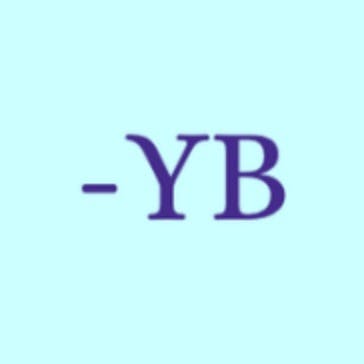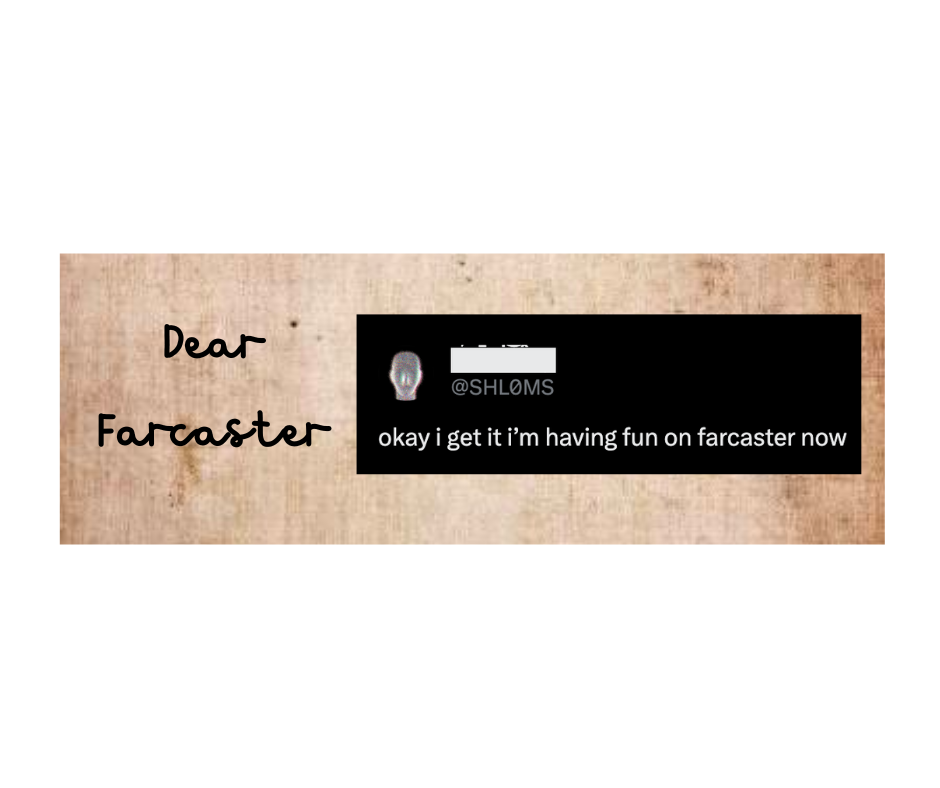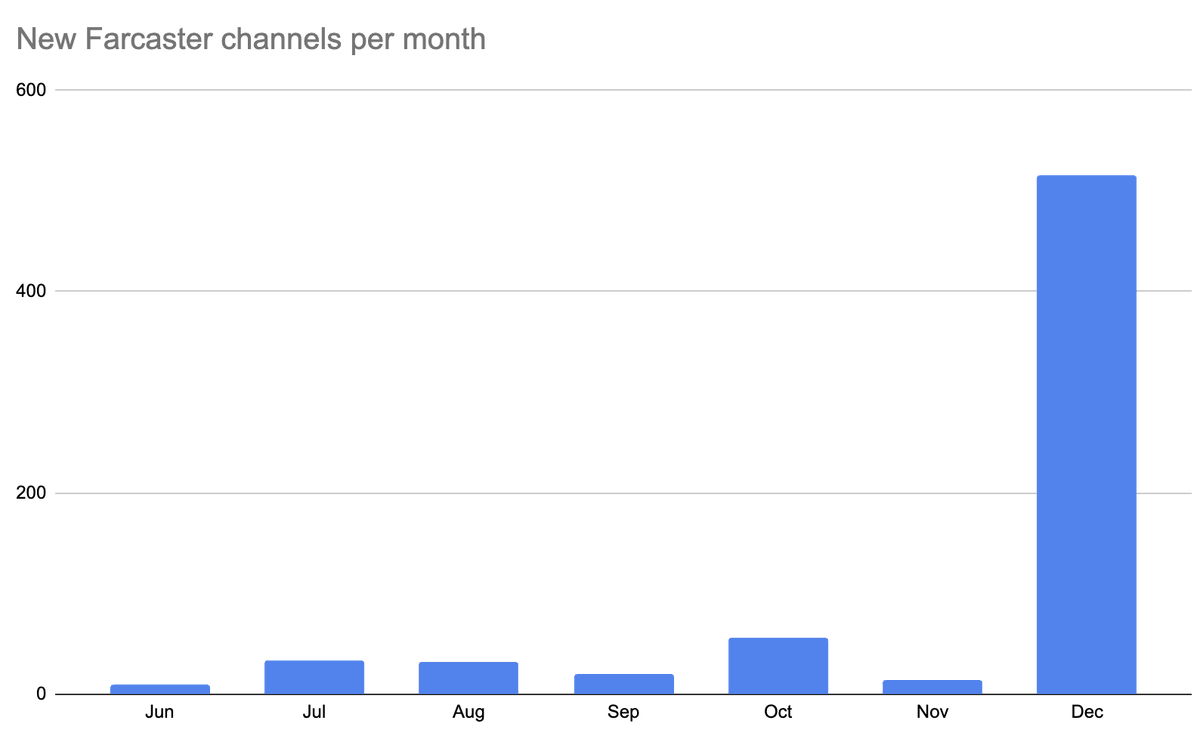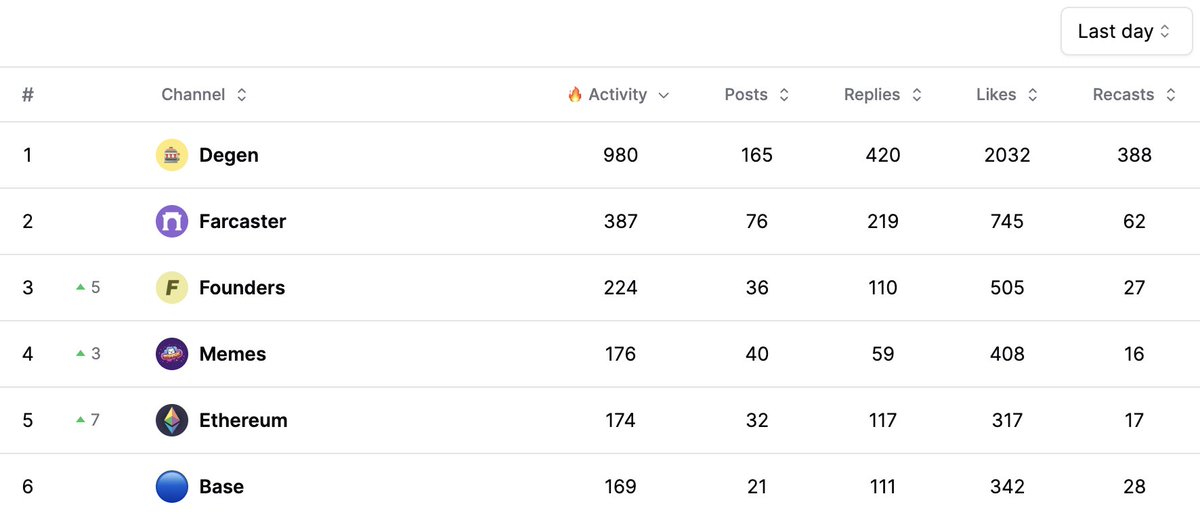Welcome to the 3 new people who joined the onchain letters community since Sunday!
I'm thankful for all 60 of you and I hope everyone is having a great start to the week 🔥
If you're enjoying my writing, please share Onchain Letters with your friends in Crypto 🤝
A letter to Farcaster:
Key Takeaways
Currently, users on Farcaster have the unique opportunity to shape the conversation, collaborate quickly, receive quality feedback, and directly engage with crypto accounts (i.e. Vitalik) that would otherwise not happen on saturated platforms.
The Farcaster community right now parallels the early days of communities such as Ethereum, Twitter, etc. It's important to always be looking for the next scenius in tech and double down.
Up until recently, the crypto founder playbook was to start a Discord. But now, heading into the next bull market, it should be a no brainer for founders and community managers to start by creating a Farcaster channel.
I split this letter into three sections:
The Farcaster arbitrage
Call to action for anyone who wants to get started in Farcaster
Responses from interviews I did with founders active on Farcaster
Farcaster Arbitrage
I want to caveat this post and make it clear that the goal is not to present some hyperbull shill case for people to drop everything and spend all their time on Farcaster. Feel free to if you want, but Twitter & Reddit are still where the digital citizens live today and simply can't be ignored.
Rather, the core point I want to share is that more people in crypto should be taking advantage of the Farcaster arbitrage.
What does this mean?
Currently, users on Farcaster have the unique opportunity to shape the conversation, collaborate quickly, receive quality feedback, and directly engage with crypto accounts (i.e. Vitalik) that would otherwise not happen on saturated platforms.
The signal to noise ratio is high right now but as the # of Farcaster daily active users (DAU) increases over time, some of the opportunities currently present will naturally start to fade away.
I often see critiques from people in crypto that there is too much of a crypto focus on Farcaster. And to that I would say two points.
1) Since the launch of channels, there's been a significant improvement in how users can filter their feeds based on their interests.
And 2) If you're actively building and investing in crypto and still not using Farcaster, then you're missing the whole point of the arbitrage.
If you're a crypto founder, Farcaster is the perfect place to get quality feedback on your product.
If you're an investor in crypto, Farcaster is the perfect place to source quality projects.
If you're looking to work in crypto, Farcaster is the perfect place to find a job at a quality company.
If you're a crypto native creator, Farcaster is the perfect place to find active content minters.
"The Farcaster community is the closest thing I've felt to the early days of the Ethereum community and why I'm full-time building in the ecosystem.
Missed opportunity if you're not connecting with folks on there (channels enable you to connect with others on similar interests)" - Linda Xie
As with any successful ecosystem, the architecture and technology is half the battle. The other half is getting the initial community genuinely excited to engage with the mission and opportunities. There needs to be a curious and experimental culture present early on in order for the community to come up with game changing innovations that eventually attract more people.
And it's clear that Farcaster fits the description above.
Let's take the concept of channels itself as a start. Initially, the first channel was used as a test for the few people attending the inaugural FarCon (Farcaster Conference). And then, another one was set up last June to have a live discussion of game 5 of the NBA finals. After the back to back hits, there was clearly an excitement amongst the community so the team quickly figured out a plan to lean into this new meta. And in the following months, Dan slowly released different kinds of channels while paying close attention to user behavior. By December, Farcaster looked completely different and was ready for permissionless channels.
In 6 months, Farcaster went from being a "decentralized Twitter" to a crypto Reddit-Twitter hybrid that no one expected. It was risky but there was mutual appreciation within the community for the quick experimentation.
But it's not just the core team, folks on Farcaster are genuinely excited to ship quickly and try new things. This can be in the form of collaboration, bounties, feedback, AMAs, bonding curve memecoins, etc.

As Linda mentioned, the Farcaster community right now reminds her of the early Ethereum community. I wasn't around in the crypto community back in 2015-2017 so I spent some time finding interesting posts on r/Ethereum to better understand the ~vibes~. And it's clear that the parallels are there. You can tell just from this AMA that the core Ethereum team hosted...people were genuinely curious about the new tech and community. They wanted to be there.

It's in these small, energetic communities where the next biggest projects start. For example, here's the initial idea for a dex Vitalik wrote up on r/Ethereum ~8 years ago. This inspired Hayden Adams to start building Uniswap in 2017 and the rest is history.

However, as the technologies and communities grow, there comes a point where it makes most sense to start searching for the next scenius. In crypto, that may have meant you started on Bitcoin Forum, then moved over to r/Ethereum, then found a home on crypto Twitter, and finally shifted your attention to high signal discords popping up with the rise of DAOs.
Today it's clear to me that if you're actively building a consumer crypto product or are engrossed in the Ethereum community, then there is no higher leverage (+EV) move than being active on Farcaster.
Farcaster is the next scenius to pay attention to in crypto. High quality community members are actively experimenting, questioning, learning, and having fun while doing it.
Again, the Farcaster arbitrage doesn't mean you need to quit other social medias. Rather it's a chance for you to find new opportunities and feel a different kind of energy that you otherwise would not have been able to on larger platforms.
As Paul Graham said in his Hacker News essay, "the good things in a community site come from people more than technology".
But as the Farcaster community continues to grow, the arbitrage will quickly diminish.
Why? Because the high concentration of people playing a positive sum game will eventually be diluted with the inevitable trolls, reply guys, etc.

Remember, things can very quickly start to change. User growth, as we've seen on a variety of web2 platforms, is like a pressure cooker. The first few years, things are slowly cooking and all of a sudden even the early community can't recognize the platform they're on. While the early Twitter vibes are still around, I highly recommend jumping on board.

I'll end this section with a beautiful quote from Adrienne Shulman:
"Farcaster is full of creative geniuses, loosely organized around a common vision for a decentralized social network, bound by common values such as candor, intellect, curiosity, and truth. It is the ultimate scenius. And if it stays this way, it will unleash more innovation and inventions than can be imagined today."
Call to Action
Note: this section applies to anyone but is geared towards founders.
Okay, we talked a lot about the importance of being on Farcaster, but how can you take advantage of what's going on?
The simple answer is to just hop in, introduce yourself on f/welcome, and start having fun with the cool people on Farcaster.

But if you're looking for a more strategic route, I would say start by picking a set of channels that you find interesting and are helpful to your work.
For example, if you're a founder of a ZK startup, try joining f/founders, f/ethereum, f/dev, and of course f/zk.
Once you've joined, take a second to feel the energy and try replying to a few people already active in those channels. You can even see who the channel leads are and DM them with a quick hello.
By simply being active for a few weeks, I'm sure you'll notice people asking you questions about what you're building, how they can onboard to your product, etc. Remember: it's not like Twitter, you don't have to shill, just be yourself. It was after I started using Farcaster that I realized I hadn't found my online voice on Twitter even after using it for years.
Brian Kim sums up the pro of being an early stage founder on FC:
Most consumer products don't need more than a few hundred users when they navigate the idea maze. Farcaster is perfect for this use case since Dan, Varun, and team have ported over the highest quality cohort from Crypto Twitter.
Once you feel comfortable with that, I'd say the next step would be to start a channel for your startup. You can of course do this immediately as well but I personally believe getting used to Farcaster and understanding channel dynamics would benefit anyone new.
Currently, there's a variety of founders that are building in public and fostering a strong community with their early users. Some good examples include: f/Paragraph, f/Daylight, f/bounties, f/kiwi-news, f/Zora, and f/Base.
Up until recently, the crypto founder playbook was to start a Discord. But now, heading into the next bull market, it should be a no brainer for founders and community managers to start by creating a Farcaster channel.
And even if you're not a founder, I suggest following the same route. Try to provide value wherever you can and people will surely notice and join the party. With any social network, early adopters receive the unique opportunity to build a following and establish themselves with a certain "brand" fairly quickly.
It's in your best interest to become active in a few channels you're passionate about (doesn't have to be work related) and/or grow a new channel.
Heck, you can even start a channel that's your own name and have it serve as your "FB page".

The last point is that though Farcaster is Ethereum centric right now, that doesn't have to be discouraging for those who are active in Solana, AVAX, etc.
Rather, I would encourage folks to take the opportunity and establish themselves as the "Solana defi guy", "Near infra thought leader", etc. On Twitter, these kinds of roles are already overdone but there's a wedge in the market to try teaching others not in the same L1 ecosystem about the cool things going on. For example, can you be the person who convinces folks in Ethereum to get started on Solana by guiding them to interesting new projects? Most people are not maxis...they just lack the time to explore and feel comfortable where they are.
Of course, there will always be sub-communities and rivalries. But it's the toxicity between ecosystems that makes crypto Twitter unbearable.
And this is where Farcaster has a strategic advantage right now: the early positive sum thinking promotes a sense of curiosity, not competition.
I wanted to end this letter by providing some viewpoints from the Farcaster community members themselves.
Last week, I asked several people these three questions:
What do you feel differentiates Farcaster from your experience on Twitter?
How has being active on Farcaster helped build and grow your product?
How do you decide what to post to Twitter vs Farcaster?
The responses are all below! I wanted to specifically call out the answers from Briang - he gave a more down to earth response on his experience. His answers highlight the fact that the "nice" environment isn't always beneficial and sometimes you need Twitter for a greater variety in thinking and open mindedness.
Overall, however, I hope the responses help tie the ribbon on this letter: there's clearly a strategic advantage of being active on Farcaster right now regardless of what you think the future of the platform is.
That's all for today's letter!
- YB
Interview Responses
Questions
What do you feel differentiates Farcaster from your experience on Twitter?
How has being active on Farcaster helped build and grow your product?
How do you decide what to post to Twitter vs Farcaster?
Colin
1. FC has a very large number of creators, builders, entrepreneurs, technologists all in one place. Twitter feels much less credible & much more click-baity. Engagement feels a lot more authentic and true on Farcaster.
2.A large part of Paragraph’s gtm was focused on Farcaster. We built many integrations atop the FC social graph, which really resonated with creators there. Additionally, building in public, creating & running a channel, etc, has been very valuable in fostering real connections with my users and soliciting feedback.
3. I pretty much stopped using Twitter 😅 I mainly just retweet now. All my original thinking goes on Farcaster
Linda:
1. Farcaster has a concentrated amount of builders / creatives in the community so it’s been incredible getting to connect with others, get feedback, and share learnings. For example, I find the Founders channel to be really valuable for early stage startup learnings. People are not as focused on trying to post things just for engagement like what I’ve increasingly experienced on Twitter but rather genuine connections with each other .
2. I’m building directly in the Farcaster ecosystem so all user feedback has helped guide us with what we’re building at Bountycaster and Farcaster makes it easy for us to directly engage with our users
3. I mostly post my content only on Farcaster these days. Sometimes for product announcements, I’ll cross post to Twitter if I want to increase reach. Probably the only times I post on Twitter is if it’s something I know specifically needs to get a lot of reach just since I have a larger following on Twitter. Farcaster is significantly better anytime I want genuine feedback or nuanced viewpoints.
Briang
1. Farcaster needs more pvp and open mindedness.
2. Great in the beginning, stopped helping when I started adding betting features.
3. Good question. fc feels safer and people have more context on me so I post dumber and more personal stuff on fc. but twitter posts have the chance of going viral in ways fc can’t compete with so purely for that reason i find myself posting on twitter more nowadays.
Jason Goldberg
Hi, I'm Jason Goldberg, founder and CEO of Airstack
1. Farcaster is the best place to network, share, and collab with Ethereum builders.
2. Being active on Farcaster has helped Airstack connect with new clients & ecosystem partners, and we've even hired through Farcaster! We regularly find Farcaster community members asking for help and expertise that Airstack is ideally suited for. We've also regularly rely on the Farcaster community for product introductions and feedback.
3. On Farcaster we post with an eye towards engaging with fellow builders, whereas Twitter is more for broader awareness.
Graham McBain
1. Twitter is a giant feed, and although there is the TPOT phenomenon you're still competing for attention against every thinkfluencer on the planet. With Channels you can get a very specific audience to look at your cast and get feedback.
2 I've been able to get feedback at every stage of the product development cycle. I've also been able to get early customers and beta testers.
3. I basically don't post on Twitter at all anymore. Except to reply to friends tweets.
Cassie
1. Farcaster has greater authenticity and curiosity in interactions. I've said strong critiques of the crypto space and instead of being drowned in CT garbage (and spam) it's been honest discussion.
2. Farcaster was instrumental in getting early adopters for a complex product. The audience is early adopter heavy (makes sense, FC itself is early, so it's already attenuated for such an audience), so they're willing to deal with rough edges.
3. I don't, I just post on FC.
Samuel
1. What do you feel differentiates Farcaster from your experience on Twitter?
Farcaster is mainly honest conversations going back on forth, with people joining in with thoughtful takes or helping each other out, while twitter has become littered with scam ads, mentions and these drown the good conversations and make
2. How has being active on Farcaster helped build and grow your product?
Being active on Farcaster got me connected with people that are too spammed elsewhere and have thoughtful conversations leading to podcast recordings and cooperation. The podcast grew out of people wanting to help me understand the business side of crypto and wanting to have conversations. I then decided that I need to record this as the people are just too high quality to not record it. Boom podcast was born and now I am figuring that game out.
3. How do you decide what to post to Twitter vs Farcaster?
I generally post Farcaster and reply there. Twitter I crosspost root casts and any thoughts I have also just to check if anyone might respond. Though Farcaster channels allow for specific prompts that only go there since twitter timeline doesn't care about the se "offtopics" that in the right topic themed channel create beautiful interactions on Farcaster.

- Loading comments...



 214
214


